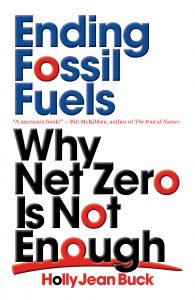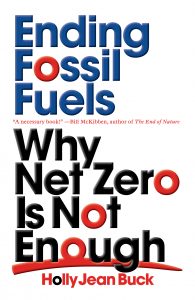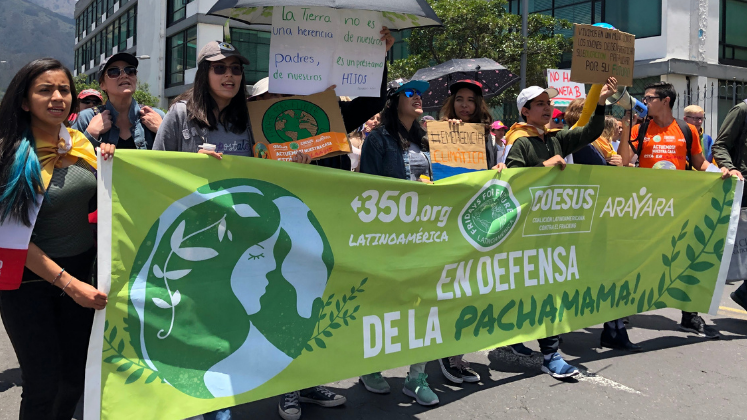In Ending Fossil Fuels: Why Net Zero is Not Enough, Holly Jean Buck argues that the framework of net zero and its concentration on emissions diverts public and policy attention from the fundamental task of ending the use of fossil fuels to ensure effective and lasting climate change mitigation. Reviewing the book ahead of the start of COP26, Sibo Chen recommends this thought-provoking analysis of the barriers to decarbonisation to anyone concerned about the looming climate catastrophe.
This book review has been translated into Mandarin by Ni Xu Gang Metta 倪勖罡 (LN814, teacher Dr Lijing Shi) as part of the LSE Reviews in Translation project, a collaboration between LSE Language Centre and LSE Review of Books. Please scroll down to read this translation or click here.
Ending Fossil Fuels: Why Net Zero is Not Enough. Holly Jean Buck. Verso. 2021.
 It feels almost cliched these days to hear the warning that ‘climate change presents the biggest challenge modern humans have ever faced’. After all, everyone has been living with an ongoing crisis since COVID-19’s global outbreak back in early 2020. There is mounting evidence indicating that the pandemic’s significant economic cost has given rise to a climate delay discourse that portrays climate change as a secondary concern to economic recovery.
It feels almost cliched these days to hear the warning that ‘climate change presents the biggest challenge modern humans have ever faced’. After all, everyone has been living with an ongoing crisis since COVID-19’s global outbreak back in early 2020. There is mounting evidence indicating that the pandemic’s significant economic cost has given rise to a climate delay discourse that portrays climate change as a secondary concern to economic recovery.
Nonetheless, the past few months have also highlighted how increasing and intensifying climate hazards like floods, heatwaves and wildfires have disrupted governments’ pandemic responses. The situation has deteriorated to the point where even the International Energy Agency (IEA) has issued a dire warning about a looming climate catastrophe if the world does not prevent a post-lockdown surge in emissions. This warning, in line with many other messages from climate experts and environmental organisations, emphasises the critical need to reach and sustain ‘net zero’ as early as possible.
But will net zero be sufficient to avert the impending climatic catastrophe? This is the central question that Holly Jean Buck examines in her new book, Ending Fossil Fuels: Why Net Zero is Not Enough. Buck argues that the net zero framework’s concentration on emissions diverts public and policy attention away from the more fundamental issue: effective and lasting climate change mitigation requires an unwavering end to the fossil fuel sector.

Image Credit: Photo by Scott Rodgerson on Unsplash
The book discusses the importance of initiating a planned phaseout of fossil fuels in three parts. Part One, ‘The Cruel Optimism of Net Zero’, elaborates the appeals and drawbacks of net zero. While acknowledging that reaching net zero by 2050 is an ambitious target in contrast to the current pace of global decarbonisation, chapters in this part argue that the concept’s embrace of balance and stability creates ambiguity that the fossil fuel sector may exploit.
Specifically, Part One invites readers to envision two possible scenarios that have achieved net zero: a ‘cleaner fossil world’ versus a ‘near zero world’. In the former scenario, fossil fuels with lower carbon intensity are still produced, but net zero emissions are maintained via carbon storage and other means of sucking up tremendous amounts of carbon. By contrast, the latter scenario eliminates the use of fossil fuels from most human activities and thus only requires the construction of modest infrastructure for generating negative emissions.
While both scenarios achieve net zero emissions, they require divergent mindsets on purposefully phasing out fossil fuels. According to Buck, the major risk of naively accepting net zero rhetoric is that it may lock the planet into ‘a permanent condition where fossil fuels continue forever, re-interpreted as part of sustainable carbon management’ (29). In such a society, both public and policy attention is redirected toward quantifying and balancing emissions. Consequently, the economic and political structures legitimising carbon-intensive economic growth, responsible for today’s planetary climate crisis, remain intact.
Part Two, ‘Five Ways of Looking at Fossil Fuel Phaseout’, evaluates five approaches for initiating a planned decline of fossil fuels, an extremely difficult undertaking that will require close coordination across all sectors of society. Accordingly, the approaches outlined in this part do not operate in isolation. Only through collective efforts can society begin to delegitimise the material and ideological underpinnings of fossil fuel production and consumption.
Three ideas stand out among the numerous ones discussed in Part Two. First, ending fossil fuels requires cultural changes beyond consumerism. In countries like the United States and Canada, fossil fuels are firmly ingrained in the social imagination of ‘good middle-class life’ since they provide the energy basis for suburban living and vehicle ownership. The biggest barrier to decarbonisation is thus cultural and political structures legitimising fossil fuel dependency as a social norm. Buck proposes instilling public awareness with a discourse on endings and transforming current neoliberal culture into one that plans.
Second, as tech giants such as Apple, Google and Microsoft dedicate greater attention to carbon removal and decarbonisation, there is rising worry about their ultimate power over monitoring, forecasting and even interfering in the environment. According to Buck’s research, what makes many of the solutions offered by tech giants especially problematic — aside from their technocratic tendencies — is how inextricably intertwined these solutions are with fossil capital. Their collective goal is to build a cleaner fossil world without introducing structural changes to capital accumulation.
Third, considering how single-use plastics, toxic chemicals and tobacco are phased out or regulated, it is vital to acknowledge the critical role of social narratives in convincing governments to support decarbonisation.
Buck contends that rural areas’ lack of public support for decarbonisation presents a significant political obstacle. Across North America, for instance, ‘the sense of peripherality experienced in rural areas fuels a dark populism’ (139). Accordingly, the core–periphery dynamic currently characterising capitalist social structures needs to be changed to address rural areas’ shared skepticism and anger about elites and government regulations.
Part Three, ‘A Phaseout Toolbox for the 2020s’, presents a checklist of actions Buck believes are critical for achieving net zero emissions by 2050. Building on earlier chapters’ insights, these action items range from modest policies already in place in some parts of the world (for example, stopping unconventional fossil fuel exploitation) to radical ones, such as putting the fossil fuel sector under public ownership and running it in reverse. Buck expresses a strong preference for government involvement over market mechanisms throughout her discussion of these policy recommendations.
Ending Fossil Fuels offers many refreshing perspectives on climate politics. It makes a strong case that the inherent ambiguity of net zero may result in a world where fossil capital continues to exert its enormous economic and political power over our daily lives. For me, the book provokes thinking about what could be achieved at the upcoming COP26 Summit and why grassroots political power needs to play an essential role in finding climate mitigation strategies that would benefit communities currently under the unsustainable exploitation of fossil capital.
Another merit of the book is its optimism: despite outlining various difficulties confronting the road to net zero, the book presents emerging evidence in Part Three that it is still possible to launch a controlled demolition of the use of fossil fuels over the next decades. To conclude, Ending Fossil Fuels is a thought-provoking analysis of barriers to decarbonisation, a fascinating read for anyone concerned about the looming climate catastrophe.
Note: This review gives the views of the author, and not the position of the LSE Review of Books blog, or of the London School of Economics and Political Science.
书评:终结化石燃料:为什么净零还不够
作者:霍莉·让·巴克
在《终结化石燃料:为什么净零排放还不够》中,霍莉·让·巴克 (Holly Jean Buck) 辩称,净零排放框架及其对排放的关注转移了公众和政策的注意力。导致他们忽视了结束使用化石燃料从而确保有效和持久地缓解气候变化。
在联合国气候变化大会 (COP26) 开始之前,陈思博助写了这则书评,荐这本发人深省的书给所有急切关注气候变化的人。
《终结化石燃料:为什么净零还不够》 霍莉·让·巴克。2021年
 如今听到“气候变化是现代人类面临的最大挑战”的警告,感觉几乎是陈词滥调。 毕竟,自 2020 年初新冠病毒全球爆发以来,每个人都生活在持续危机中。越来越多证据显示,新冠疫情造成的巨大经济成本引发了气候延迟论调,将气候变化描述为经济复苏中次要的问题。
如今听到“气候变化是现代人类面临的最大挑战”的警告,感觉几乎是陈词滥调。 毕竟,自 2020 年初新冠病毒全球爆发以来,每个人都生活在持续危机中。越来越多证据显示,新冠疫情造成的巨大经济成本引发了气候延迟论调,将气候变化描述为经济复苏中次要的问题。
尽管如此,过去几个月凸显了洪水、热浪和野火等气候危害的增加和加剧是如何扰乱政府应对疫情的措施。 近年来,情况已经恶化到连国际能源署 (IEA) 都发出了严峻的气候警告。若各国不阻止封锁后排放量激增,气候灾难将会到眉睫之际,无法再拖了。 显然的是,这个警告与气候专家、环境组织的许多信息一致,都强调了我们需要尽早实践和维持“净零”。
但是,净零是否足以避免即将到来的气候灾难呢? 这是霍莉·让·巴克在她的新书《终结化石燃料:为什么净零还不够》中研究的核心问题。 巴克认为,净零框架对排放的关注转移了公众和政策的注意力。要有效并持久地减缓气候变化,就必须终止化石燃料行业。

Image Credit: Photo by Scott Rodgerson on Unsplash
这本书分成三个部分讨论了启动逐步淘汰化石燃料计划的重要性。 在第一部分“净零的残酷乐观”中,她阐述了净零的优缺点。 她表示在当前全球脱碳步伐的前提下,设下2050年净零排放的目标的确雄心勃勃。她接着说明同时拥抱平衡和稳定的概念会导致目标的模糊性,而化石燃料行业有可能乘虚而入。
具体而言,第一部分邀请读者设想两种可能实现净零的情景:“更清洁的化石世界”与“接近零的世界”。 在第一种情况下,我们仍然生产碳强度较低的化石燃料,但通过碳储存和其他大量吸收碳的方式来维持净零排放。 而第二种情况是大量减少使用化石燃料,并以建造适度的基础设施来产生负排放。
虽然这两种情况都实现了净零排放,但是它们在逐步淘汰化石燃料方面需要保持截然不同的心态。 根据巴克的说法,无所顾忌地接受净零言论存在风险。主要风险是它可能会将地球锁定在一个“永久持续使用化石燃料的状态”(29)。 因此也把它解读为“可持续碳管理”的一部分。在这样的社会中,公众和政策的注意力都会转向量化与平衡排放。后果就是,当今的经济和政治结构都会把碳密集型经济增长合理化,而并非对症下药。全球气候危机很有可能继续持续发展。
在第二部分(“五种看待化石燃料淘汰的方式”),巴克评估了启动有计划减少化石燃料的五种方法。无疑,这是一项极其艰巨的任务,需要社会各阶层的密切协调。 她在该部分中概述的方法也并非孤立运行。 只有通过集体合作努力,社会才能开始把支撑化石燃料生产与消费的物质和意识形态“非法化”。
此外,在第二部分所讨论的众多想法中,有三个想法尤为突出。 首先,停止使用化石燃料需要超越消费主义的文化变革。 在美国、加拿大等国家,化石燃料在“中产阶级的美好生活”的社会想象中根深蒂固。从郊区生活到拥有汽车,化石燃料提供了能源基础。 因此,脱碳的最大障碍是把社会对化石燃料的依赖性融入为社会规范的文化和政治结构中。巴克建议通过与公众检讨关于未来的气候情景,并将当前的新自由主义文化转换为会未来而计划的社会。
其次,随着苹果、谷歌和微软等科技巨头更加关注碳去除和脱碳,人们越来越担心它们会在在监测、预测甚至于干扰环境方面得到最终权力。根据巴克的研究,科技巨头提供的许多解决方案的问题在于它们与化石资本密不可分。他们的共同目标是在不引进/进行资本积累结构性变化的情况下建立一个更清洁的化石世界。
第三,随着我们逐渐淘汰或严厉管制一次性塑料、有毒化学品及烟草,我们也需要承认以社会叙事的方式来说服政府脱碳的重要性。
巴克觉得,缺乏农村地区的公众支持对脱碳来说是个重大的政治障碍。 例如,在北美,“农村地区的边缘感助长了黑暗民粹主义”(139)。 因此,当前表征资本主义社会的核心-外围结构需要改变,以解决农村地区对精英与政府监管的共同怀疑和愤怒。
第三部分是为“2020年代逐步淘汰碳排放的工具箱”。巴克列出了她所认为的在2050 年前实现零排放的至关重要的行动。基于前几章的见解,这些行动项目包括一些国家已经实施的温和政策(例如,停止开采非常规化石燃料),和激进的政策(譬如,将化石燃料工业部门公有化且反向运行)。 巴克个人观点强烈偏向于对政府干预,而不是(非) 依赖于市场机制。
《终结化石燃料》为气候政治提供了许多有趣的观点。 它强有力地证明净零的模糊性可能会导致化石资本持续在我们的日常生活中发挥其巨大的经济和政治力量。 对我来说,这本书引发了我的思考:在即将到来的 COP26 峰会上,什么样的目标能够实现?为何基层政治权力需要在寻找缓解气候策略方面发挥它的重要性,从而让目前处于不可持续的化石资本开发中的社群受益?
这本书还有另一个优点,就是它乐观的态度。尽管本书概述了通往净零的道路上所面临的各种困难,它在第三部分中分享了新的证据,表示在未来几十年内仍有可能进行有控制地拆除化石燃料。 总而言之,《终结化石燃料》深刻分析了脱碳所面临的障碍。对于所有关注气候转变的人来说,这就是一本引人入胜的好书。








3 Comments